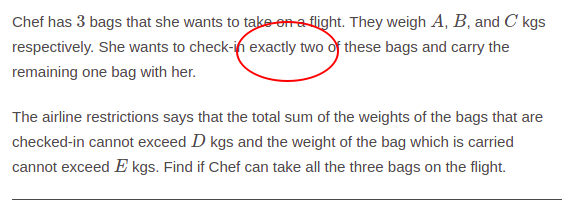PROBLEM LINK:
Practice
Contest: Division 1
Contest: Division 2
Contest: Division 3
Author: Daanish Mahajan
Tester: Istvan Nagy
Editorialist: Aman Dwivedi
DIFFICULTY:
Cakewalk
PREREQUISITES:
None
PROBLEM:
Chef has 3 bags that she wants to take on a flight. They weigh A, B, and C kgs respectively. She wants to check in exactly two of these bags and carry the remaining one bag with her.
The airline restrictions say that the total sum of the weights of the bags that are checked-in cannot exceed D kgs and the weight of the bag which is carried cannot exceed E kgs. Find if Chef can take all the three bags on the flight.
EXPLANATION:
Just do as the problem say and check all the possible combinations. If any of the combinations satisfy the airline rules, we can simply print YES otherwise NO.
The possible combinations that can be are as follows:
- Bag A and Bag B are checked in while Bag C is carried.
- Bag B and Bag C are checked in while Bag A is carried.
- Bag A and Bag C are checked in while Bag B is carried.
If any of the combinations satisfy the airline rules then Chef can take all the three bags and hence print YES else NO.
TIME COMPLEXITY:
O(1) per test case.
SOLUTIONS:
Author
#include<bits/stdc++.h>
using namespace std;
#define ll long long int
#define pb push_back
#define rb pop_back
#define ti tuple<int, int, int>
#define pii pair<int, int>
#define pli pair<ll, int>
#define pll pair<ll, ll>
#define mp make_pair
#define mt make_tuple
using namespace std;
const int maxt = 36000;
const string newln = "\n", space = " ";
int main()
{
int t, a, b, c, d, e; cin >> t;
while(t--){
cin >> a >> b >> c >> d >> e;
string ans = "No";
if((a + b <= d && c <= e) || (a + c <= d && b <= e) || (b + c <= d && a <= e)){
ans = "YeS";
}
cout << ans << endl;
}
}
Tester
#include <iostream>
#include <cassert>
#include <vector>
#include <set>
#include <map>
#include <algorithm>
#include <random>
#ifdef HOME
#include <windows.h>
#endif
#define all(x) (x).begin(), (x).end()
#define rall(x) (x).rbegin(), (x).rend()
#define forn(i, n) for (int i = 0; i < (int)(n); ++i)
#define for1(i, n) for (int i = 1; i <= (int)(n); ++i)
#define ford(i, n) for (int i = (int)(n) - 1; i >= 0; --i)
#define fore(i, a, b) for (int i = (int)(a); i <= (int)(b); ++i)
template<class T> bool umin(T& a, T b) { return a > b ? (a = b, true) : false; }
template<class T> bool umax(T& a, T b) { return a < b ? (a = b, true) : false; }
using namespace std;
long long readInt(long long l, long long r, char endd) {
long long x = 0;
int cnt = 0;
int fi = -1;
bool is_neg = false;
while (true) {
char g = getchar();
if (g == '-') {
assert(fi == -1);
is_neg = true;
continue;
}
if ('0' <= g && g <= '9') {
x *= 10;
x += g - '0';
if (cnt == 0) {
fi = g - '0';
}
cnt++;
assert(fi != 0 || cnt == 1);
assert(fi != 0 || is_neg == false);
assert(!(cnt > 19 || (cnt == 19 && fi > 1)));
}
else if (g == endd) {
assert(cnt > 0);
if (is_neg) {
x = -x;
}
assert(l <= x && x <= r);
return x;
}
else {
assert(false);
}
}
}
string readString(int l, int r, char endd) {
string ret = "";
int cnt = 0;
while (true) {
char g = getchar();
assert(g != -1);
if (g == endd) {
break;
}
cnt++;
ret += g;
}
assert(l <= cnt && cnt <= r);
return ret;
}
long long readIntSp(long long l, long long r) {
return readInt(l, r, ' ');
}
long long readIntLn(long long l, long long r) {
return readInt(l, r, '\n');
}
string readStringLn(int l, int r) {
return readString(l, r, '\n');
}
string readStringSp(int l, int r) {
return readString(l, r, ' ');
}
int main(int argc, char** argv)
{
#ifdef HOME
if (IsDebuggerPresent())
{
freopen("../in.txt", "rb", stdin);
freopen("../out.txt", "wb", stdout);
}
#endif
int T = readIntLn(1, 36'000);
int sumN = 0;
forn(tc, T)
{
int A = readIntSp(1, 10);
int B = readIntSp(1, 10);
int C = readIntSp(1, 10);
int D = readIntSp(15, 20);
int E = readIntLn(5, 10);
if ((A + B <= D && C <= E) ||
(A + C <= D && B <= E) ||
(B + C <= D && A <= E))
printf("YES\n");
else
printf("NO\n");
}
assert(getchar() == -1);
return 0;
}
Editorialist
#include<bits/stdc++.h>
using namespace std;
#define int long long
void solve()
{
int a,b,c,d,e;
cin>>a>>b>>c>>d>>e;
if(((a+b)<=d && c<=e) || ((a+c)<=d && b<=e) || ((c+b)<=d && a<=e))
cout<<"YES"<<endl;
else
cout<<"NO"<<endl;
}
int32_t main()
{
// freopen("input.txt","r",stdin);
// freopen("output.txt","w",stdout);
int t;
cin>>t;
while(t--)
solve();
return 0;
}

